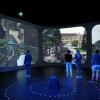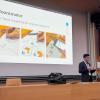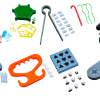phd
- As tech advancements speed up, consider how best to incorporate AI tools at school and work.
- ATLAS PhD student studies how brain activity syncs when musicians perform together.
 Hye-Young Jo of computer science and the ATLAS Institute will be using the funding to research human-computer interactions.
Hye-Young Jo of computer science and the ATLAS Institute will be using the funding to research human-computer interactions.- ATLAS PhD candidate Casey Hunt brings STEM learning to local classrooms with Lego robotics.
 ATLAS PhD student David Hunter researches novel ways to interact with different moments in time across a single video stream.
ATLAS PhD student David Hunter researches novel ways to interact with different moments in time across a single video stream. PhD student Krithik Ranjan analyzed 33 student learning tools and developed a “spectrum of tinkerability” that offers designers new ways to think about teaching computational skills.
PhD student Krithik Ranjan analyzed 33 student learning tools and developed a “spectrum of tinkerability” that offers designers new ways to think about teaching computational skills. Members of three ATLAS labs show how interactive technology can create possibilities for new means of productivity, data analysis, creativity and play.
Members of three ATLAS labs show how interactive technology can create possibilities for new means of productivity, data analysis, creativity and play. Nanomaterials and neuroscience researchers aim to build brain/body interfaces that enhance performance, improve health monitoring and support mobility.
Nanomaterials and neuroscience researchers aim to build brain/body interfaces that enhance performance, improve health monitoring and support mobility. The Emergent Nanotechnology Lab team has begun research to develop new bioplastics made to be used as fertilizer at end-of-life.
The Emergent Nanotechnology Lab team has begun research to develop new bioplastics made to be used as fertilizer at end-of-life. Recycling is extremely difficult for things built with more than one type of plastic. Michael Rivera and the Utility Research Lab team have developed a novel way to disassemble 3D-printed objects for easy recycling.
Recycling is extremely difficult for things built with more than one type of plastic. Michael Rivera and the Utility Research Lab team have developed a novel way to disassemble 3D-printed objects for easy recycling.


